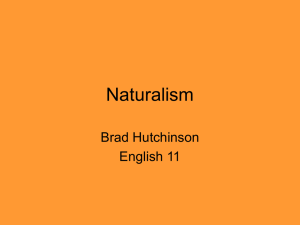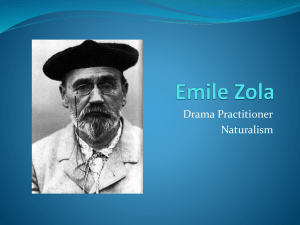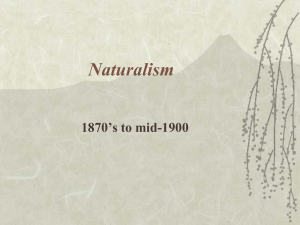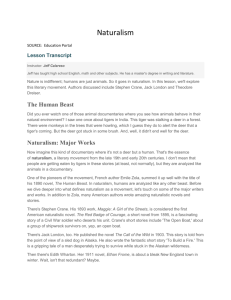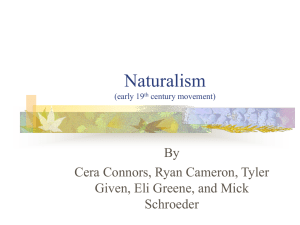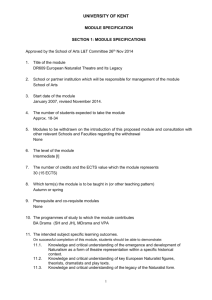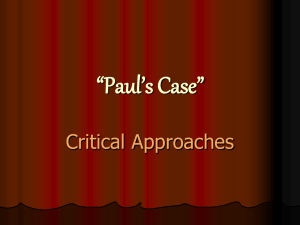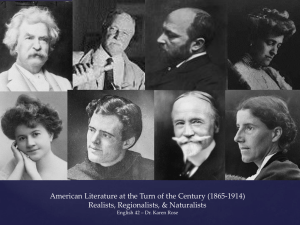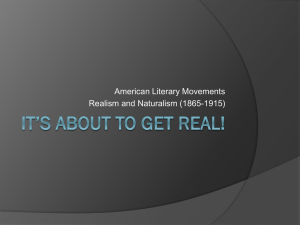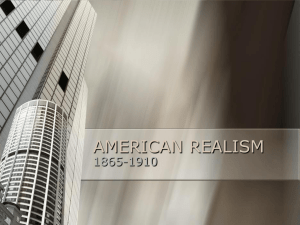reszitnyk_dissertati..
advertisement
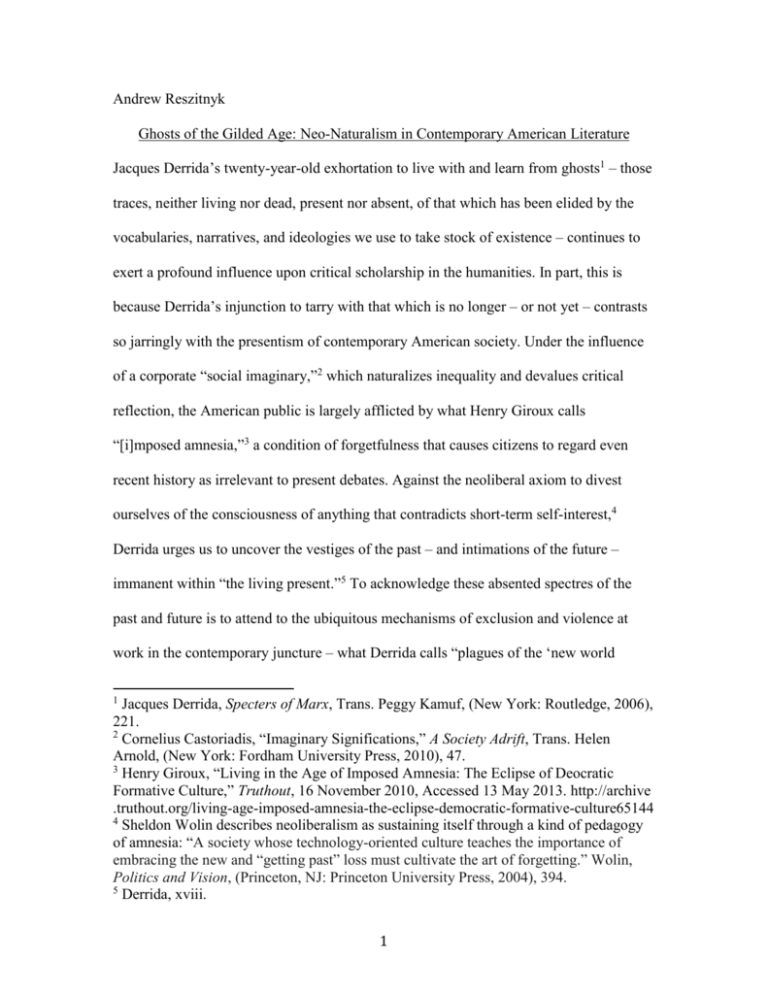
Andrew Reszitnyk Ghosts of the Gilded Age: Neo-Naturalism in Contemporary American Literature Jacques Derrida’s twenty-year-old exhortation to live with and learn from ghosts1 – those traces, neither living nor dead, present nor absent, of that which has been elided by the vocabularies, narratives, and ideologies we use to take stock of existence – continues to exert a profound influence upon critical scholarship in the humanities. In part, this is because Derrida’s injunction to tarry with that which is no longer – or not yet – contrasts so jarringly with the presentism of contemporary American society. Under the influence of a corporate “social imaginary,”2 which naturalizes inequality and devalues critical reflection, the American public is largely afflicted by what Henry Giroux calls “[i]mposed amnesia,”3 a condition of forgetfulness that causes citizens to regard even recent history as irrelevant to present debates. Against the neoliberal axiom to divest ourselves of the consciousness of anything that contradicts short-term self-interest,4 Derrida urges us to uncover the vestiges of the past – and intimations of the future – immanent within “the living present.”5 To acknowledge these absented spectres of the past and future is to attend to the ubiquitous mechanisms of exclusion and violence at work in the contemporary juncture – what Derrida calls “plagues of the ‘new world 1 Jacques Derrida, Specters of Marx, Trans. Peggy Kamuf, (New York: Routledge, 2006), 221. 2 Cornelius Castoriadis, “Imaginary Significations,” A Society Adrift, Trans. Helen Arnold, (New York: Fordham University Press, 2010), 47. 3 Henry Giroux, “Living in the Age of Imposed Amnesia: The Eclipse of Deocratic Formative Culture,” Truthout, 16 November 2010, Accessed 13 May 2013. http://archive .truthout.org/living-age-imposed-amnesia-the-eclipse-democratic-formative-culture65144 4 Sheldon Wolin describes neoliberalism as sustaining itself through a kind of pedagogy of amnesia: “A society whose technology-oriented culture teaches the importance of embracing the new and “getting past” loss must cultivate the art of forgetting.” Wolin, Politics and Vision, (Princeton, NJ: Princeton University Press, 2004), 394. 5 Derrida, xviii. 1 order’”6 – and to recognize that these mechanism are not without precedent: they constitute reiterations of crimes committed long ago. Although the number of specters that cry out for our attention is infinite – and the task to respond to them, endless7 – there will always be some whose attendance at a given moment seems more discernible, and whose cries more urgent, than others. In the eyes of numerous theorists and public intellectuals, present-day American society is haunted most powerfully by the ghosts of the late nineteenth and early twentieth century, the period known as “the Gilded Age.”8 A time of immense social stratification, when numerous atrocities were committed against African-Americans, Indigenous peoples, and women, the Gilded Age saw the almost total domination of the nation’s political, social and cultural affairs by the ultra-wealthy. Then, as now, American society was in thrall to an uninhibited market rationality, which held that the marginalized were responsible for their own destitution, that elites were to be admired and emulated (not taxed), and that there was no difference between corporate good and social good.9 Resonances of the Gilded Age can be detected not only in the United States’ recent politico-economic policies, and popular culture, but also its literary productions. In my dissertation, I argue that contemporary American literature is marked by a resurgent naturalism, a literary 6 Derrida, 100. For Derrida, it is necessary that the present be haunted, since to exorcise all ghosts – and to render thereby the present fully present – would be to unravel the temporal conditions of life itself. See Hägglund 2008. 8 See, for example, Remnick 2001; Aronowitz 2005; McHugh 2006; Krugman 2007; Giroux 2008; Bartels 2010; Reich 2012; Grusky and Kricheli-Katz 2012; Crawford 2013. 9 See Howard Zinn, “Robber Barons and Rebels,” A People’s History of the United States, (New York: Harper Perennial Modern Classics, 2010). 7 2 movement that emerged in the United States10 in part as a response to and symptom of Gilded Age excesses.11 Naturalism is a school of literature with a decidedly pedagogical intent. Its aim is to teach readers to inquire into the root causes of experience and formative conditions of behavior, empowering them to strip away the veneer of normalcy and self-evidence that mask the everyday violence committed under laissez-faire capitalism. Characterized by their belief that human life is determined by inhuman forces – such as heredity, natural selection, and chance – naturalist writers depict the lives of ordinary, working-class individuals in an unflinchingly realistic, and often pessimistic, fashion.12 In Maggie: A Girl of the Streets (1893), for example, Stephen Crane represents the plight of a poor girl from the Bowery, who, after being forced to work as a menial labourer and prostitute, ends up dead of unknown (presumably violent) causes, abandoned by her family, betrayed by her lover, and forsaken by the society that has allowed her to wither needlessly away.13 Naturalist authors depict the margins of American life, illustrating near fantastical situations of depravity with haunted language that often verges on mystical. By using romantic literary techniques – such as elevated, emotionally charged 10 It is important to note that naturalism neither an exclusively American, nor an exclusively literary, phenomenon. Literary naturalism is commonly understood to have begun in France with the work of Émile Zola, a writer who would prove to be immense influence on authors in Britain and the United States. Philosophical naturalism, by contrast, is a predominantly American tradition, which champions the integration of philosophical inquiry and the scientific method, and which holds that the laws of nature are all that really exists. 11 Donald Pizer argues that naturalism sprang out of the realization that “the conditions of urban and industrial life as well as the new understanding of man’s animal origin seemed irreconcilable to the concepts of human dignity and freedom inherent in traditional religious, philosophical, and political belief.” Pizer 7. 12 See Pizer 2004. 13 Stephen Crane, Maggie: A Girl of the Streets and Other Short Fiction, (New York: Bantam Classics, 1986), 1-73. 3 prose – in order to articulate what they consider to be the actual conditions of life under capitalism,14 the naturalists “attempt to represent the very objects realism cannot bring into focus.”15 Kate Chopin exemplifies this tendency in The Awakening (1899) when she describes Edna Pontellier’s process of coming to grips with her sexuality and “position in the universe”16 as a conversation between her soul and the abyssal ocean. Adopting a stance of radical objectivity, which holds that the deep – and often mysterious – causes of behavior are more real than empirical appearances, the naturalists aspire to unveil what Frank Norris calls the “secretest life”17 of human beings, and what Theodor Dreiser refers to as “the other half of life, in which we have no part.”18 Due to their fascination with the fundamental causes of human reality, the naturalists exists in a complicated relationship with the unrestrained capitalist and Social Darwinist ethos of late nineteenth/early twentieth century America. The naturalists’ concern with the pernicious consequences of Gilded Age capitalism for those marginalized by class, gender, or race has led some critics to argue that they were progressive thinkers, who sought to awaken the empathy necessary to unite disparate populations into a common public.19 This interpretation of the movement’s politics is The naturalists differentiate themselves from their realist contemporaries – with whom they are occasionally mistaken – through their employment of Romantic techniques and conviction that there is more to reality than can be detected through the senses. 15 Christophe Den Tendt, “American Literary Naturalism,” A Companion to American Fiction 1865-1914, Ed. Robert Paul Lamb and G.R. Thompson, (Malden, MA: Blackwell Publishing 2005), 110. 16 Kate Chopin, The Awakening, (Chicago: Herbert S. Stone and Company, 1899), 33. 17 Frank Norris The Responsibilities of the Novelist. In The Literary Criticism of Frank Norris, ed. Donald Pizer, 81–98. Austin: University of Texas Press, 1964), 77. 18 Dreiser, Theodore (1986). Sister Carrie. Har- mondsworth: Penguin (Pennsylvania Edition), 176. 19 Amy Kaplan, for example, argues that naturalist authors “focus on class difference to forge the bonds of a public world that subsumes those differences.” Amy Kaplan, The 14 4 supported by the fact that many of the most prominent naturalists were avowed socialists.20 If we regard naturalist texts as leftist, we can see naturalism as not only the product of the Gilded Age, but also the harbinger of the period that would succeed it: the Progressive Era, an epoch of American history remembered for its significant social reforms.21 Other critics regard naturalism’s evacuation of human agency and conflation of physical and social laws as a depoliticizing alibi for the inevitability of capitalistic “progress.”22 They point to such examples as Norris’ The Octopus (1901), a novel about the clash between wheat farmers and a railroad company, in which the railroad’s magnate ascribes all accountability for the conflict to natural forces: “The Wheat is one force, the Railroad another, and there is the law that governs them – supply and demand. Men have…little to do in the whole business.”23 As a consequence of their ardent determinism, the naturalists seem to absolve the perpetrators of capitalist violence of Social Construction of American Realism, (Chicago, University of Chicago Press, 1992), 12. See also Parrington 1930, Kazin 1956, Berthoff 1981. 20 Dreiser in particular, was well known for being a member of the United States Communist Party. 21 This is not to say that all members of American society experienced the benefits of this reform equally. While some undeniably progressive political measures were taken during this time – such as Franklin Delenor Roosevelt’s New Deal, the Indian Citizenship Act, which gave full citizenship to all Native Americans, and the Nineteenth Amendment, which gave women the right to vote – violence and discrimination against numerous sectors of the American population continued apace. The ultra-wealthy were allowed to wreck the nation’s economy in 1929, African Americans remained marginalized under the Jim Crow laws, Native Americans were forced to attend Indian Boarding Schools, labour unions continued to meet fierce resistance, and women were still treated as second-class citizens. See Zinn, “Self-Help in Hard Times” A People’s History of the United States, (New York: Harper Perennial Modern Classics, 2010). 22 See, for example, Bowlby 1985; Michaels 1987; Seltzer 1992; Thomas 1997. 23 Frank Norris, “The Octopus,” Novels and Essays, (New York: Library of America, 1986), 1037. 5 ethical and political responsibility.24 Walter Michaels goes so far as to suggest that naturalist authors’ representations of the underclass’ suffering is meant to alleviate the consciences of those complicit with the ravages wrought by America’s laissez-faire economy, arguing that “In naturalism…all fictions…are corporate fictions.”25 Still other critics have accused the naturalists of substantiating the self-interested masculinity promoted within Gilded Age culture. The authors’ tendency to address unsettling subjects without holding back – and their valorization of self-made, entrepreneurial characters – is more about performing an authorial toughness than giving voice to disenfranchised, these critics claim.26 My own conviction is that the diversity of interpretations concerning naturalism’s politics attests to the movement’s political ambivalence. As Donald Pizer notes, naturalism is more an “impulse” than a “school,”27 which is characterized by a set of techniques, tendencies, and pedagogical imperatives that can be put to different uses in different contexts. I contend that, regardless of whether naturalist authors were progressive or reactionary, naturalism remains a valuable framework through which to ponder the variegated effects of – and to dwell with the multitude of spectres engendered by – an unchecked free market. 24 In this, the naturalists seem to echo the sentiment of John D. Rockefeller, a man who, due to his active role in the impoverishment of large swathes of the American public, should be a natural foil of the naturalist authors. In famous speech delivered to an Sunday school, Rockefeller declared that “The growth of a large business is merely a survival of the fittest… merely the working-out of a law of nature and a law of God.” Qtd. in Richard Hofstadter, Social Darwinism in American Thought, Philadelphia: University of Pennsylvania Press, 1955), 46. 25 Walter Michaels The Gold Standard and the Logic of Naturalism: American Literature at the Turn of the Century, (Los Angeles: University of California Press, 1988), 213. 26 See Dudley 2004; Den Tendt 2005; Barrish 2011. 27 Donald Pizer, The Theory and Practice of American Literary Naturalism, (Carbondale and Edwardsvill Illinois: Southern Illinois University Press, 1992), 7. 6 In my dissertation, I make a case for the enduring power of this framework, arguing that a mode of naturalism re-emerges in contemporary American fiction. I demonstrate this re-emergence by illustrating the presence of naturalist philosophical preoccupations, socio-political concerns and literary conventions in three works of contemporary American literature: Toni Morrison’s Jazz (1992); Thomas Pynchon’s Mason & Dixon (1997); and Cormac McCarthy’s The Road (2006). All three are acknowledged classics, published in the two decades after “the End of History” 28 when neoliberalism, the hegemonic mode of laissez-faire capitalism today, became normalized in the United States and “embed[ded]…as rationality in everyday social organization and imagination.”29 While some critics have acknowledged the presence of naturalist tropes in individual works produced by these authors,30 none have yet suggested that these texts indicate the appearance of an emergent tradition of neo-naturalism in recent American literature. Although various critics have claimed that naturalism persists beyond the time period usually associated with the movement, to date none have made a case for its widespread reappearance in the literature of the 1990s and 2000s.31 By illuminating the 28 See, Francis Fukuyama, The End of History and the Last Man, (New York: MacMillan, 1992). 29 Nick Couldry, Why Voice Matters: Culture and Politics After Neoliberalism, (Thousand Oaks California: Sage Publications, 2010), 5. 30 For example, Eric Carl Link for the naturalism in McCarthy’s Blood Meridian and Child of God Dwight Eddins “Orphic naturalism” (Dwight Eddins) in Pynchon’s Gravity’s Rainbow, Patrice Cormier-Hamilton suggests that Toni Morrison’s The Bluest Eye an example of “Black Naturalism,” Eric Carl Link, “McCarthy and Literary Naturalism,” The Cambridge Companion to Cormac McCarthy, Ed. Steven Frye, See Patrice Cormier-Hamilton, “Black Naturalism and Toni Morrison: The Journey away from Self-Love in The Bluest Eye” MELUS Vol. 19, No. 4, Ethnic Women Writers VI (Winter, 1994), 109-127; 31 Kecia Driver Thompson, however, has suggested that something naturalism can be detected in David Simon’s much-lauded television series The Wire. See, “Deserve Got 7 resonances of naturalist aesthetics and philosophy, and of the first Gilded Age’s approaches to racial, sexual and economic justice in these novels, my project adds to the existing body of scholarship concerning American naturalism, Pynchon, McCarthy, and Morrison, and contemporary American literature more generally. Not only does naturalism “refuse to die,”32 as Pizer claims, its insights and pedagogical injunctions are more powerful and provocative than ever. Through its rearticulation of the early naturalist imperative to seek out the foundations of modern society, neo-naturalism permits us to use the American literature of the 1990s and 2000s to attend to and critique the far-ranging consequences of free market fundamentalism. At the same time, it empowers us to puncture the presentism of the contemporary moment, hearken to the enduring spectres of violence spawned by America’s laissez-faire past and present, and recall the steps taken by activists, organizers, and politicians to mitigate this violence during the Progressive Era. By bringing the literary productions of the first and second Gilded Age into dialogue with current political struggles, and by reclaiming the pedagogical force of these productions, my dissertation contributes not only to literary studies, but also to the vast archive of political criticism addressing the ongoing injustices wreaked by neoliberalism. The neo-naturalism that I claim manifests in contemporary American literature emerges from the same impulse that quickened the earlier tradition – the desire to “bridg[e] the gap”33 between the world as it appears to be and as it really is, in a time Nothing to Do with It: Black Urban Experience and the Naturalist Tradition in The Wire,” Studies in American Naturalism, Vol. 7 No. 1 (Summer 2012). 32 Pizer, 22. 33 Donna M. Campbell, “Dreiser, London, Crane and the Iron Madonna,” American Naturalism, Ed. Harold Bloom, (Broomall PA: Chelsea House, 2004), 302. 8 when largely unseen economic forces influence individuals’ lives to an incredible degree – but it also departs from this tradition in significant ways. American neo-naturalism might be called, pace Timothy Morton,34 naturalism without nature. Like the earlier naturalist authors, the neo-naturalists display a fascination with the fundamental immanent conditions and causes of humanity’s way of being in the world. Unlike them, however, neo-naturalists do not presume that these conditions and causes are legible: they do not even believe that a clear delineation can be made between the world of conditioned appearances and that of unconditional causes. For example, in Mason & Dixon, Pynchon makes numerous references to disproven pseudo-sciences supposed to access the primal forces of the universe – such as dowsing, astrology, and geomancy – and conspicuously declines to devalue them vis-à-vis sciences like astronomy. Pynchon refuses to grant that any form of knowledge has privileged contact to the real. Throughout the text, reality becomes stranger and stranger – and more and more opaque – the more humans discover: it remains irreducible to and uncapturable by human apprehensions, even if it is somehow inherent in them.35 As the Learned English Dog – the character Pynchon presents as most knowledgeable about the nature of reality – explains, although “[t]here is ever an explanation at hand” for the questions humans pose to the universe, these explanations only amount to “Provisions for Survival in a World See Timothy Morton, Ecology Without Nature (Cambridge, MA: Harvard University Press, 2009). 35 Pynchon describes the essential conditions of existence as not just inexpressible, but unspeakable – i.e. it negates all attempts at reference or decipherment in advance. He calls it “the Unspoken,” suggesting that it shows “brute Contempt for any language but that of winds and masses, cries and blood. Impenetrable, it calls up questions whose Awkwardness has only increas’d as the Astronomers have come to understand that there may be no way of ever finding the Answers.” Pynchon, Mason & Dixon, 37. 34 9 less fantastick.”36 The various strategies humans employ to access reality are simplifications of the world, which transform it into something “less fantastick” than it actually is in order to render it livable. The forces that govern the lives of characters and systems in the texts I study are determining, but not determinate: they do not disclose themselves to those who seek them, and yet are also not transcendental to the act of seeking. By foregrounding the universe’s illegibility, indeterminacy and immanence, the neo-naturalists radicalize the stance of their earlier naturalists. Although the latter believe reality is indifferent to human beings, they also suggest that it can, for the most part, be measured by science and described by language – or, at the very least, that science and language will provide better accounts of it over time. In Sister Carrie, Dreiser typifies this position when he suggests that humanity will eventually direct “the needle of understanding…to the distinct pole of truth.”37 Contemporary naturalists distinguish themselves most clearly from their predecessors by their skepticism towards the notion that there could ever be a “pole of truth” towards which understanding can orient itself. My dissertation is divided into five chapters, which are intended to provide a broad account of naturalism’s resurgence, and to make the case that this resurgence has the pedagogical effect of raising what Tony Judt calls “the social question” – the enduring problem of how to create the democratic sites necessary to do justice to the public as a whole.38 In Chapter One, I discuss how the contemporary United States echoes the economic policies, socio-political conflicts, and cultural norms of the first Gilded Age, arguing that recent American literature reflects these uncanny. I suggest that, Pynchon, 18. Dreiser, Sister Carrie, 138. 38 Tony Judt, Ill Fares the Land, (London: Penguin Press, 2010), 174. 36 37 10 just as the conditions of the first Gilded Age precipitated the rise of naturalistic literature, those of the second Gilded Age have spawned a new tradition of literary naturalism. Briefly discussing the philosophical and literary origins of naturalism in the United States, I outline the movement’s complicated relationship with Darwinism, post-Kantian philosophy, and the racial/sexual/economic politics of late nineteenth/early twentieth century America. I show how the spectral remainders of these phenomena reappear – and assume new forms – within Mason & Dixon, The Road, and Jazz. In Chapter Two, I clarify how contemporary naturalism departs from the literary conventions and philosophical convictions of the earlier tradition. I suggest that the neonaturalists’ skepticism towards the prospect of obtaining legible accounts of reality causes them to represent novelic universes ruled by indeterminate – as opposed to specifiable or measurable – and yet immanent causal forces. The almost spiritual tendency within all matter to progress towards extinction and “silence”39 in The Road is an example of such a force, as is the polymorphous, unfixable “Wind”40 in Mason & Dixon, and the effervescent, intoxicating “music the world makes”41 in Jazz. In Chapter Three, I contrast the social realism of neo-naturalists with that of earlier naturalists. Whereas early naturalists sought to illustrate the real conditions of disenfranchised individuals in their own time, neo-naturalists aim to unveil general truths about the present moment through narratives that take place in diverse times and places. While both are concerned with representing reality as individuals of different social strata experience it, contemporary naturalists propound a new vision of objectivity, which 39 Cormac McCarthy, The Road, 274. Pynchon, 43. 41 Toni Morrison, Jazz, 130. 40 11 posits that the real is neither transparently available nor ineffably transcendent. Morrison’s stated intention to make Jazz “become” the Jazz Age, “rather than be about [it]”42 exemplifies the neo-naturalist interpretation of social realism and objectivity. Neonaturalist texts attempt not to represent reality, but to be reality. In Chapter Four, I address neo-naturalism’s politics, unpacking its relationship with neoliberal figurations of subjectivity, race, class, and gender. The modes of subjectivity dramatized in neo-naturalist texts are certainly not straightforward critiques of the idealized subject of neoliberalism – the opportunistic, masculinist homo economicus43 – given that they often bear a distinct resemblance to it.44 However, I suggest that they do represent an alternative to it, insofar as, unlike homo economicus – who is imagined to be unmarked by social privilege or deprivation45 and motivated unselfconsciously by greed – the characters in these texts are almost universally conscious of being haunted by the spectres of those who have been harmed by systematic injustices. It is this experience of haunting that I suggest constitutes the political core of neo-naturalism. Through its illustration of haunted characters and invocation of the victims of both Gilded Ages, neo-naturalist texts reinforce Derrida’s now twenty-year-old lesson: that if we wish to build a better future, we must learn how to learn from ghosts. 42 Morrison, Jazz, 9. See, Foucault 2008. 44 For example, the protagonist of The Road is an intensely individualistic, independent character, who is driven by his desire for personal survival – and for the survival of his son – rather than by any sort of public feeling. 45 This evacuation of difference and homogenization of subjectivity within neoliberalism occurs, Giroux explains, because “[t]he culture of corporate public pedagogy largely cancels out or devalues gender, class-specific, and racial injustices of the existing social order by absorbing the democratic impulses and practices of civil society within narrow economic relations.” Henry Giroux, “Neoliberalism as a Public Pedagogy,” Against the Terror of Neoliberalism, (Boulder CO: Paradigm Press, 2006), 106. 43 12
